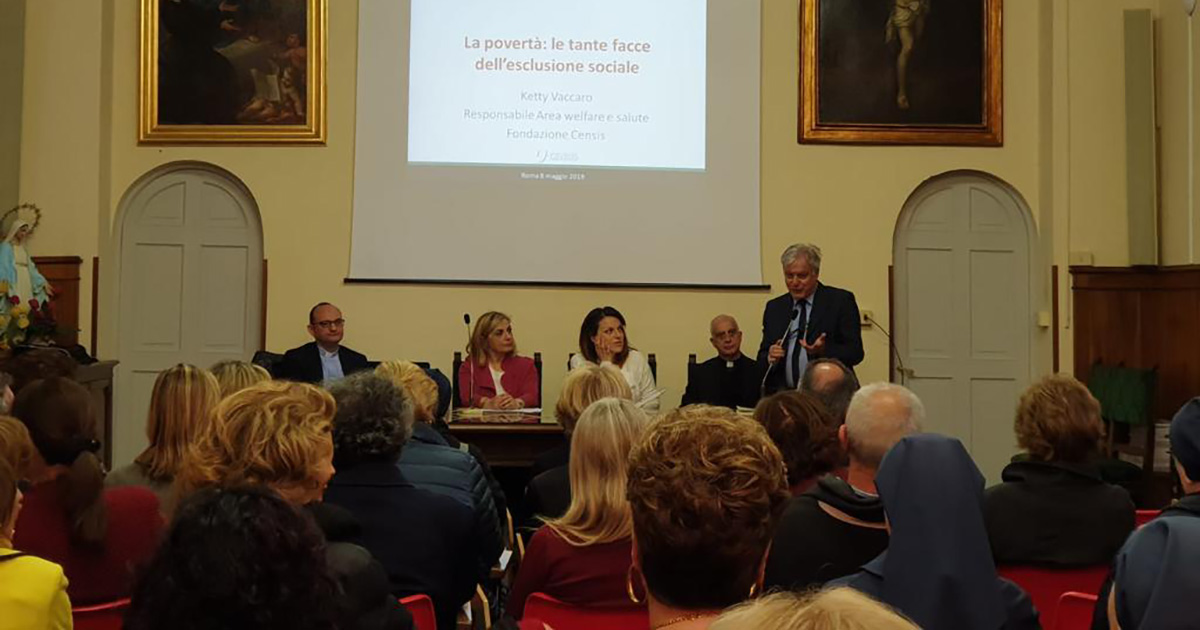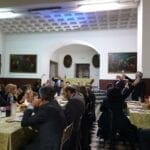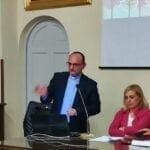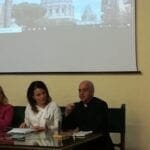On Wednesday, May 8, a meeting “The Church, the Poor and Volunteers” took place at the Leonian College on Pompeo Magno 21 in Rome, organized by the Vincentian Social Center. Participants included S.E. Monsignor Rino Fisichella, President of the Pontifical Council for the Promotion of the New Evangelization (who talked with us about the World Day of the Poor), Dr. Ketty Vaccaro, Director of the health and welfare center, CENSIS, and Father F. Valerio Di Trapani CM, President of the “Vincentian Social Center”. Senator Edoardo Patriara, member of the XI Permanent Commission (Public and Private Labor, Social Security) and the Parliamentary Commission for Children and Adolescents, brought a greeting from various public institutions. Giuseppe Castiglione, a member of parliament in the last legislature, also addressed a few words.
During his speech, Monsignor Fisichella referred to the teachings of the Holy Father and some concepts expressed by the Pope in the Apostolic Exhortation, Evangelii Gaudium, in particular the passage in which the Pope writes: “I want to say, with regret, that the worst discrimination which the poor suffer is the lack of spiritual care. The great majority of the poor have a special openness to the faith; they need God and we must not fail to offer them his friendship, his blessing, his word, the celebration of the sacraments and a journey of growth and maturity in the faith. Our preferential option for the poor must mainly translate into a privileged and preferential religious care (EG, #200).”
Pope Francis, in his Message for the Second World Day of the Poor, reiterated that idea when he stated: “to overcome their oppressive situation, [the poor] need to sense the presence of brothers and sisters who are concerned for them and, by opening the doors of their hearts and lives, make them feel like friends and family.” It is an invitation to a listening that becomes an intervention, a concrete action, to say aloud that we do not accept the reality of indifference and impassivity that today, perhaps more than in any other era, characterizes our society.
“In 2017, it was estimated that in Italy there were 3,171,000 families in relative poverty (with an incidence equal to 12.3% among all resident families), affecting a total of 9,368,000 individuals (15.6% of the entire population). Of these, 4,669,000 were women (15.1%), 2,156,000 were minors (21.5%) and almost 1,400,000 elderly (10.5%),” said Dr. Vaccaro, who, during her presentation, gave concrete visibility to many different situations of hardship in Italy. Let’s consider, for example, the widening of the social gap and the weakening of the spending capacity of the weakest: “If we said that the average expenditure of Italian families is 100, in the case of families of workers, it would be today in 72 (76 in 2014), and that of the families of employers is 123 (120 in 2014).” The surprising element is the absence of perspectives that arise from the data: “96% of people with low educational qualifications and 89% of those with low incomes are convinced that they will remain in their current condition, for them it is not realistic to be able to attain a better situation in the course of their lives. Only 45% of Italians believe that they have the same opportunities as others to improve their lives (36% among workers, 30% among those living in the south of the peninsula) (the average in the European Union is 58%). Less than a third think that, in Italy, people really get what they deserve. 56.3% of Italians declare that the situation of the country has not begun to change.”
The Vincentian Social Center, in the central district of Prati, in Rome, has been active since 1984, thanks to a collaboration agreement with the Leonian College, which contributes to the costs of services, and receives help from many benefactors, including Pope Francis.
The Vincentian Social Center is involved in many activities: for example Luciana House, founded in 1989 by Maria Adelaide D’Amelio Buranelli, and the Listening Center founded in 1984 by Father Luigi Menichelli. Today, the Listening Center deals with people who live on the streets, both Italian and foreign. They receive and listen to their requests, from the recognition of their citizenship rights, providing support to people in their difficulties: the search for housing, the search for employment, professional training, the writing of their resumes, the management of administration procedures for the issuance of documents, orientation to social and health assistance, Italian courses for foreigners, orientation to services dedicated to the fight against addiction to alcohol, drugs or gambling, information about events and cultural places open to public; it also accompanies people through personalized programs, so that they can recover their full autonomy.
Every day, at Luciana House, Vincentian volunteers support mothers in the education of their children and organize extracurricular activities for the children. For the mothers, the volunteers organize personalized courses in cooking, sewing, Italian language and culture. Mothers have time to stay at Luciana House until the end of their personal program. This is achieved when the mother has developed the skills to establish herself autonomously and responsibly, has acquired the right cognitive and emotional tools for the independent care of her children, has achieved autonomy and professional stability.
The Holy Father invites us to take concrete steps: “On this World Day, we are asked to fulfill the words of the Psalm: ‘The afflicted shall eat and be satisfied’ (Ps 22:26)”: at the end of the meeting, a charity lunch was offered in the Leoniano School Hall – to raise funds for for the homeless.
Elena Grazini














0 Comments